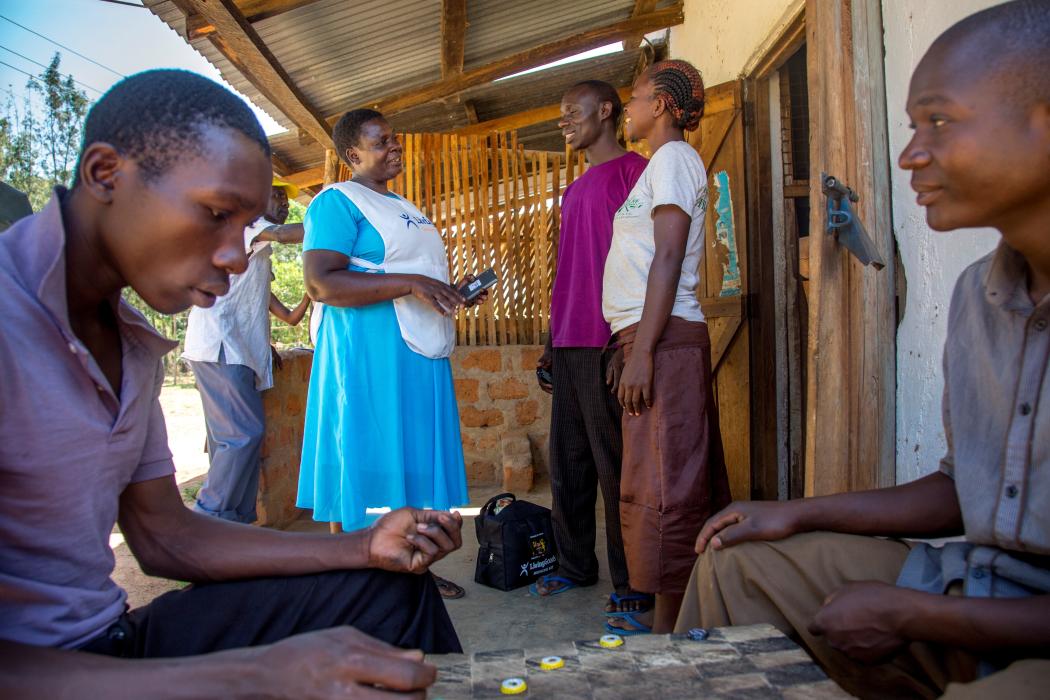Accountability Key to Sustaining Frontline Health Worker Successes

A Living Goods-supported community health worker uses mobile technology while talking to members of her community
By Nayantara Watsa, Living Goods
Frontline health workers require the support of strong health systems to thrive and improve the lives of those they serve. Conversely, health systems and their associated governments require a robust community health workforce that can deliver the services that resource-poor public health facilities often cannot deliver. For this to work, there must be accountability on both sides. Governments must use funds to support health workers in an effective manner, and health workers must deliver services that are of high quality. Importantly, this accountability needs to be measured.
So, when it comes to financing health workforce strengthening, how can we work with governments to improve accountability? First, we must ask what each implementing partner, donor, and government is bringing to the table—every partner has to have skin in the game. We should build structures that allow for co-financing and results-based financing so that all partners have a stake in ensuring success—this breeds accountability.
In an effort to create such a structure for accountability, Living Goods, in close partnership with the Ministry of Health in Uganda, launched a first-of-its-kind, one-year pilot of a results-based financing mechanism for community health in two districts in Uganda—Masaka and Kyotera—in June 2018. In this mechanism, 100% of the funds will be results-based, meaning that only once the results have been independently verified by Innovations for Poverty Action, Living Goods will receive payment from the Deerfield Foundation for achieving pre-agreed targets. The aim of the pilot is to create a sustainable financing mechanism that can be adopted and replicated by others—including local governments, donors, and implementing partners—to crowd in funding for community health efforts and drive impact through improved accountability in the system.
When we attract more outcome payers and implementing partners, we could consider transitioning to an impact bond—a mechanism whereby private sector investors fund the up-front cost of service delivery—and then outcome payers, including local governments, pay a return on investment to investors, if results and achievements have been independently verified. Again, this will drive accountability at scale, bringing in added rigor imposed on the system through an investor. Similarly, we are exploring other means—a debt buydown mechanism in Uganda, and an outcomes fund for community health structured by key bi/multilateral donors—which have the potential to crowd in private sector capital to create improved accountability.
For these types of financing mechanisms to work, we need to think about accountability against key metrics. In Uganda, the government is currently structuring a formal, salaried cadre of community health extension workers to be based in facilities to provide dedicated supervision to community health workers. Living Goods is intimately involved in the development of supervisor guidelines and a broader performance management framework for the workers, with technology as the primary driver of accountability.
At Living Goods, technology enables our managers to implement a best-in-class performance-management system for frontline health workers and their supervisors. All Living Goods-supported community health workers carry smartphones that they use to register and track pregnancies, diagnose and treat childhood illnesses on-site, and follow up with clients. This data is relayed in real-time onto dashboards, enabling managers to provide targeted support and incentives to motivate improved performance.
It won’t be enough to develop these systems if they are not used at scale. While there has been an emphasis on health systems strengthening for the past 40 years, we have not always done a good job of measuring the transition of capacity to governments. Living Goods is supporting governments to adopt these tried and tested accountability systems by using specific, easily measurable indicators that adequately reflect behavior change and skills development. This will ensure transparent reporting on the true degree to which government capacity has been built and sustained in the long-term.
It is also important to leverage existing partnerships to achieve success with our collective accountability agenda. We can do a lot by working with experts in health systems strengthening and health information systems to collaboratively develop contextualized solutions that are designed to deliver transformational system-wide impact. Ultimately, we want to see community health workers supported at every level and enabled to deliver their full potential.

Nyantara Watsa, Living Goods
